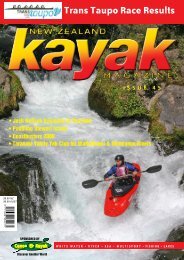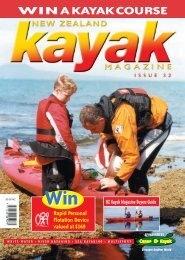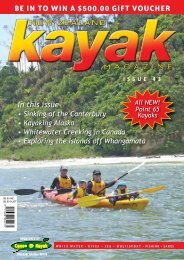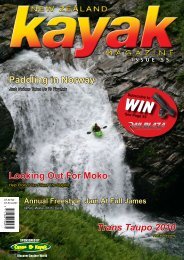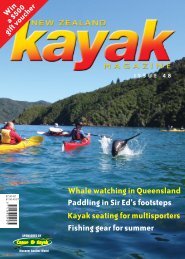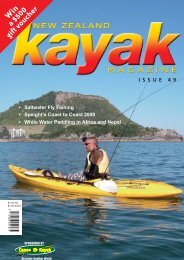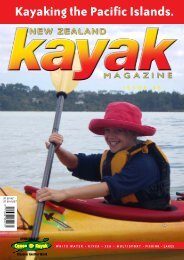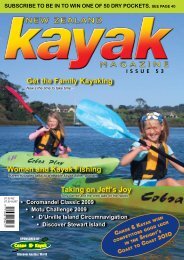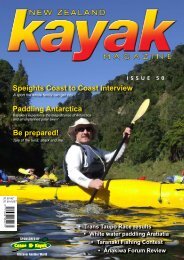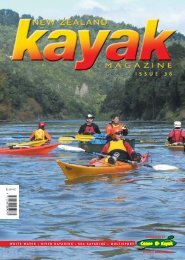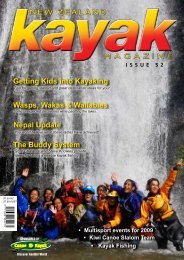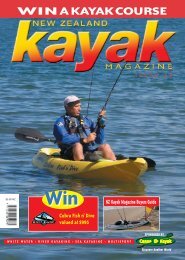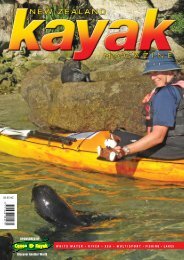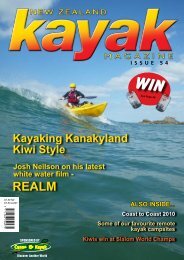c&k#35 dps-m spg - Canoe & Kayak
c&k#35 dps-m spg - Canoe & Kayak
c&k#35 dps-m spg - Canoe & Kayak
You also want an ePaper? Increase the reach of your titles
YUMPU automatically turns print PDFs into web optimized ePapers that Google loves.
OUTDOORS WITHAspects of OutdoorLeadership: Know ThyselfBy Ray HollingsworthThe kayaking session on the lake hadbeen postponed because of the wind,but the afternoon was full of thepromise of an exciting canyoning trip.The group clomped down the muddytrack, squeaking in their wetsuits,chatting nervously. The abseil into theMangatepopo Gorge had a fiercereputation and this grey day didnothing to dispel qualms. I was in a coinstructingrole, rigging the abseil forthe first time, feeling as nervous as myclients both because of the activity andbecause the Chief Instructor, MartyBeare, was observing us.At one point in the set-up, I casually clipped thesafety rope into a very thin tree branch andcontinued final preparations. My co-instructornoticed nothing. Marty, however, quietly sidled upto me and suggested that “The safety line anchorcould be improved”. Then he showed me how. Nofuss, no ego games in front of the group.Preparations complete, I clipped in anddescended into the Gorge, with the river roaringfar below.Embarrassing and EnlighteningOver the years I’ve thought about that momentand how embarrassing and enlightening it was forme. Embarrassing because I instantly felt like adrop-kick incompetent, because I should haveknown better, but had let my nervousness cloudmy thinking. Embarrassing because I’d run lots ofabseiling sessions, but none for quite a while andI had got rusty. It was a wake-up call, a warningnot to assume knowledge will be there but tomake sure it is.More significant however, was the way in whichMarty conducted himself that day, with theprescience to be there in the first place, the quietintervention and, later, the chat in the office overthe cup of tea. It was an impressive display of aman at the top of his game - he recognized apotential problem, he provided the safety net, hemade space for learning and growth.How Good Are You?One of the hardest things about developing yourleadership abilities is working out how good youactually are at various skills. What do you measureyourself against? Your peers? A mentor? Anindustry qualification? I know people who havepassed NZOIA Rock 1 with minimal experienceand inconsistent set-ups, yet now hold the samequalification as someone with a vast array ofclimbing experiences built up over years. I haveseen a group of aspirant leaders so caught up inthe world that they have created aroundthemselves that they were oblivious to their faults.No amount of suggestions, hints, or directivescould convince them that they neededimprovement. Their peer group provided acomforting cushion of ill-informed competence.Perhaps the key to working out where you are at,is to find someone or something that you respectand compare yourself to them or it. It may be achecklist of the qualities and attributes which anoutdoor instructor should have as in the book“Effective Leadership in Adventure Programming”by Simon Priest and Mike Gass. Work through thelist and ask yourself “Do I have these yet?”. If not,they become goals that you set for yourself.It could be an individual whose career you wishto emulate or whose qualities are desirable.Exposure to Marty’s calm competence andproactive involvement was something thatinspired me to attain these qualities. Later, whenI found myself in a similar role as Marty, I used thememory of how he had treated me, to guide myinteraction with new staff.Development Is A Conscious DecisionSometimes it’s a ‘pick’n’mix’ approach that worksbest - you see qualities or skills in a host of peoplethat you desire for yourself; these provide theyardstick to measure your development. When Iwas learning the trade, I wanted Bev Smith’s abilityto smile and play on rainy days; Mick Hopkinson’smastery of a variety of technical pursuits; WillMacQueen’s calmness under stress; and BrianStaite’s madcap sense of humour. I consciouslyworked on those attributes; proof of progresscame with every testing situation.Of course there are some dangers inherent incomparing yourself with others; there will alwaysbe someone who climbs or paddles harder thanyou. And what makes these people achieve in onetechnical area - for example, total focus - may bea handicap in a group or society. Similarly, youmay have attributes that are important but notnecessarily valued by a dominant peer group.Women in the outdoors often battle with aperceived lack of technical virtuosity, while theirability to empathise with and motivate studentsgoes unnoticed.Industry qualifications, such as those offered byNZOIA (NZ Outdoor Instructors Association) orMSC (NZ Mountain Safety Council) or SKOANZ(Sea <strong>Kayak</strong> Operators Association of NZ) are asolid yardstick to compare yourself against. Theyhold up a pretty reasonable mirror to yourabilities and provide a clear pathway to achievingtechnical skills. But they are a starting point, not afinish line.What Makes You Unique?Perhaps the fastest measure of your strengths andweaknesses as an outdoor leader is to ask thepeople that you work with. From canyon guide totramping club leader to sea kayak guide, everyperson running a show should solicit feedback atsome point, from both clients and fellow workers.By having the feedback written down, it allowsyou to chew over it in your own time. To ensureyou receive comment on what you want, make aform with specific questions that you wantanswered, eg: What do you feel are my strengths?How could I improve my performance as a leader?How would you rate the pre-trip planning/information? If people are given the appropriatetime and space and encouragement to fill thisform out, usually you will receive honest,thoughtful answers.Lastly, we all have things to work on, anddeveloping the ability to analyse your ownperformance is a necessary thing to do. Butequally we all have useful skills and attributes thatnot only make us unique but also bring a positivespin to our leadership role. Make a list. Knowthyself. One of the things I’ve discovered aboutmyself that has been extraordinarily useful atbuilding relationships with clients, is my love ofmusical trivial pursuits. Just ask “Who were theseven greatest rock guitarists as voted by MelodyMaker magazine in 1969?” to the next group youhave; sure as eggs someone will get hooked in!18 ISSUE THIRTYfive • 2006



